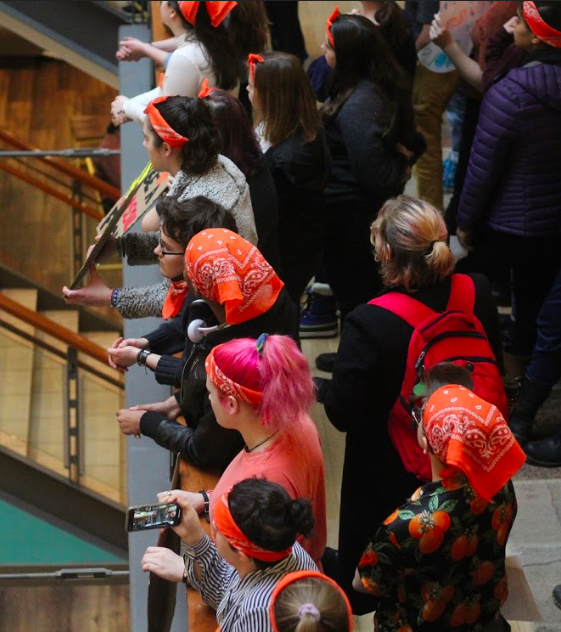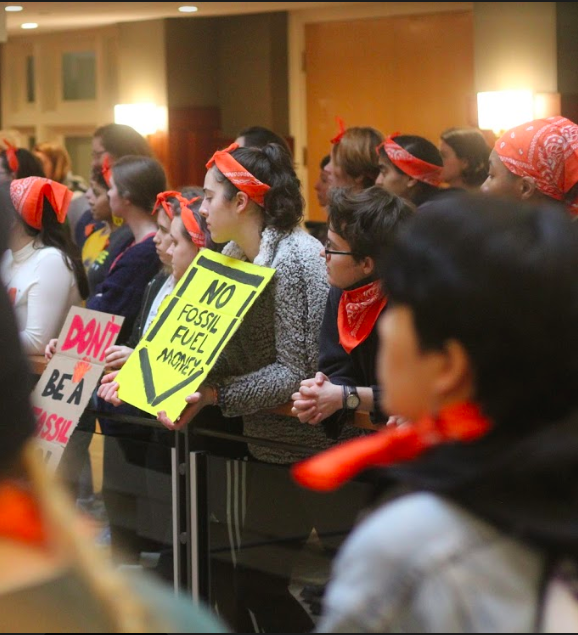BY GILLIAN PETRARCA ’23
“People are going to rise like the water, we’re going to shut this crisis down. I hear the voice of my great-granddaughter saying, ‘keep it in the ground,’” rang through the halls of Blanchard Community Center as students sang and chanted. On Feb. 13 at 12:15 p.m., over 300 students walked out of their classes to demand that Mount Holyoke College divest from fossil fuels. This protest, which was followed by a rally in Blanchard Campus Center, was organized by Mount Holyoke’s Climate Justice Coalition (CJC) on Fossil Fuel Divestment Day.
Students were met with mixed support from faculty on the day of the walkout.
“My professor was very supportive of us walking out,” Katherine Gong ’23 said. Gong said that her professor sent out an email to the class urging everyone to walk out of class in support of divestment. “My professor assured us that we would not be marked absent or penalized,” she said.
However, others were not met with the same support. After Anna Defilippis ’23 informed her sociology professor that she would be walking out, she was not met with encouragement. “She told me that if I wanted to walk out, that me and other students who were planning on walking out should just leave the class now, rather than disrupting class later,” Defilippis said.
After the 12:15 p.m. walkout, students piled into Blanchard Campus Center to protest. Many carried signs with slogans like, “The Oceans are rising and so are we!” and “Say yes to divestment.” As students entered the campus center, members of the CJC handed out orange bandanas to represent the symbolic color of fossil fuel divestment.
The rally began with a land acknowledgment from Dannye Carpenter ’20, who noted that Mount Holyoke stands on stolen Nonotuck land. Guided by Carpenter, the protestors held a moment of silence following this recognition.
“We stand in solidarity with the indigenous tribes whose land was stolen from them,” added Erica Discala ’20, a member of the CJC.
“We know that the fossil fuel industry inflicts direct and indirect violence against the most vulnerable communities across the globe,” Discala said. “By investing in fossil fuels, Mount Holyoke endorses such violence, both symbolically and materially.”
“Beyond that, they’re not just endors- ing the violence, they’re profiting from it,” Discala added. “We, as students of the College, will not stand for this. We are responsible for the community we are a part of.”
After Carpenter, the next speaker lined up was Grace Wason ’23, another member of the CJC. Watson spoke briefly on her work in Salt Lake City, Utah, as the organizer of the 2017 Salt Lake City Climate Strike. Afterwards, she read a poem to the crowd which she had adapted from activist Amanda Foreman, titled “MHC does not give a damn about me.”
“The protection of a future so universal should not be so controversial,” Wason said. “Our very existence is at stake, and our generation must partake.”
Director of the Miller Worley Center for the Environment Olivia Aguilar also spoke at the rally.
“We need to think critically about this moment,” Aguilar told the crowd. She emphasized that there is no wrong or right way to protest or to support climate justice. “Just because you all came out today does not put any of you all on a moral high ground, just like those who did not come out today for whatever reason are not any less interested in this fight.”
After Aguilar spoke, Discala introduced Emma Sullivan ’22, a founding member of the South Hadley chapter of the Sunrise Movement. The Sunrise Movement is a youth-led movement which advocates for political action to be taken against climate change. The end goal of the Sunrise Movement is to create and implement a Green New Deal.
The Sunrise Movement operates in “hubs” across the United States, and the South Hadley hub of the Sunrise Movement is located here at Mount Holyoke. One of the main goals of the South Hadley hub is to urge Mount Holyoke to divest from fossil fuels.
“We are here because we need a livable and sustainable future,” Sullivan said. Sullivan added that though Mount Holyoke claims to be sustainable, six percent of the College’s endowment is invested in fossil fuels.
“This may not seem like a lot,” Sullivan said. “But six percent of our endowment is 50 million dol-
lars.” Sullivan reminded protesters that the Board of Trustees is not in the dark about student desire for divestment. According to Sullivan, 92 percent of faculty and 88 per- cent of students supported the school’s divestment from fossil fuels in 2017.
“Not only did they ignore us, in 2017 they voted unanimously not to divest,” Sullivan said. “We can’t wait three more years for the Board of Trustees to revisit this issue.”
This past fall, the Smith College Board of Trustees voted unanimously to divest from fossil fuels. The process of divestment is projected to happen within the next 15 years. This decision came after years of Smith students’ demands to divest. Hampshire College voted to divest from fossil fuels in 2011 and the University of Massachusetts Amherst did so in 2016.
Amherst and Mount Holyoke Colleges remain the only two of the Five College Consortium that have yet to divest. The last time either of the two colleges’ Board of Trustees voted on divesting from fossil fuels — 2016 for the former and 2017 for the latter — both voted against divestment.
In 2017, when the Mount Holyoke College Board of Trustees voted against divesting from fossil fuels, Barbara Baumann ’77 was the Chair of the Board. During her time as Chair, Baumann worked as president for Cross Creek Energy Corporation. Not only was she the president of an oil company during her time serving the Mount Holyoke Board of Trustees, in the past she worked at Associated Energy Managers and BP Amoco.
Baumann took pride in the fact that she was one of few women executives in the oil industry. She has since stepped down from her position as Chair, and the position is currently held by Mindy McWilliams Lewis ’75. Currently, there are no Mount Holyoke Board of Trustee members who officially work for energy companies.
To close out the event, Discala introduced Tasha Elizarde ’22, who is from Juneau, Alaska. “We’re taking over Blanch,” Elizarde said.
Elizarde used her speech to share the way climate change is affecting her community in Alaska directly. “I used to enjoy climbing up this mountain in my hometown and looking at the view of the glaciers,” Elizarde said. “Now I can’t see the glaciers anymore, because they have melted and receded into the valley.”
“If we divest here we are one step forward to divesting everywhere,” Elizarde said.
Discala ended the rally by bringing attention to the CJC’s next action.
“On Feb. 27, there is a Board of Trustees meeting,” Discala said. “We will see the Board of Trustees there, and there is no way they can ignore us all.”
The Board of Trustees’ meeting, which was originally planned to take place in South Hadley, has since been moved to take place off-campus in New York.



